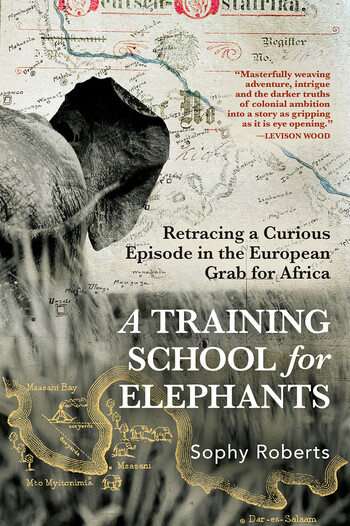If you’re in the mood for a stirring tale of heroic adventures, want to be inspired by a dreamy sojourn in the lush heart of Africa, or simply love all things elephant, do not read this book. Or rather do read this book and let author Sophy Roberts ’97JRN expand your horizons as she offers a master class in the challenges and complexities of contemporary travel writing.
A Training School for Elephants tells the little-known story of an ill-fated 1879 expedition organized by Belgian king Leopold II. At that time, greedy colonial powers were laying the foundation for the “Scramble for Africa,” and Leopold set his sights on the Congo Basin, which was rich in rubber and ivory. Anticipating the need for a reliable system to transport plundered resources off the continent, he commissioned Frederick Carter, an ambitious Irish “fixer,” to ship four tamed Indian elephants to East Africa, march them hundreds of miles from Zanzibar to Lake Tanganyika, and use them to train African elephants to become beasts of burden. Even as harebrained ideas go, it was a doozy.
Roberts sets out on her own expedition to retrace this journey, hoping to examine “how nineteenth-century European expansionism remains tightly bound with topics of enduring consequence: racism, resource extraction, wildlife extinction.” She will sleep under the stars, blend contemporary voices with voices from the archives, and try to understand how history has been shaped and silenced. As book concepts go, this is also a doozy. And yet Roberts pulls it off.
Roberts, a smart and empathetic British author, is a feted and persuasive travel writer (full disclosure: I recently took a trip to a remote lodge in the Himalayas inspired solely by one of her magazine articles). She is also a dogged researcher who happily digs through the archives for tiny details that will help bring Carter’s journey to life (the book contains more than a hundred pages of footnotes). Roberts shows enormous sensitivity to her Indigenous sources and to the cultures of ethnic groups in the region, past and present. She even makes a study of elephant husbandry, voyaging to Pune, India, where she visits “the post office where Edward Lear had drawn Pune’s elephants in the shade of the banyan trees.” Roberts’s curiosity is insatiable. If there’s a rabbit hole, she will go down it.
Contemporary travel writing can be full of clichés and superficial observations, with some authors clinging to a redemptive narrative arc and delivering neat endings on demand. Sophy Roberts is not one of these authors. She lives in the world of nuance and has an almost pathological commitment to telling the whole truth and nothing but the truth. Her journey is difficult, frustrating, even disappointing. Place names have changed with urbanization, and what was dense jungle in Carter’s day is now denuded land, decimated by climate change and empty of wildlife. As for her protagonist: Frederick Carter may have been an adventurer, but he was no hero. Prone to tantrums and plagued by insecurity, he was eager for fame and recognition at any cost. The elephants were sorely mistreated and suffered terribly at his hands.
Roberts has said that she wants “to write books that allow me to interrogate ‘big history’ through a contemporary quest.” She did this in her debut book, The Lost Pianos of Siberia, which details Roberts’s quixotic pilgrimage east of the Ural Mountains in search of a Russian piano with a significant provenance. Spoiler alert: she never finds the piano. And in A Training School for Elephants, her journey is similarly thwarted. This is a tale of greed, hypocrisy, cruelty, and folly. But for readers willing to watch an author grapple with an unwieldy and complex subject with integrity and grit, it’s worth coming along for the ride.




